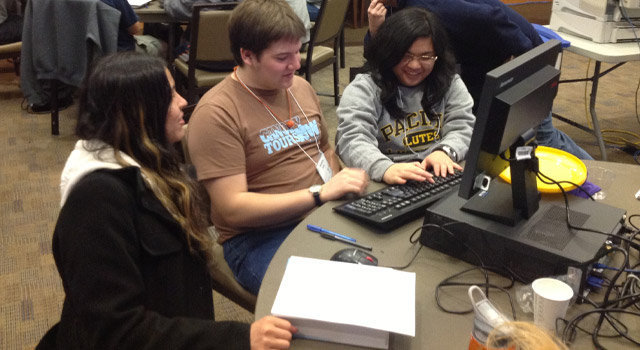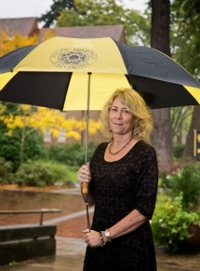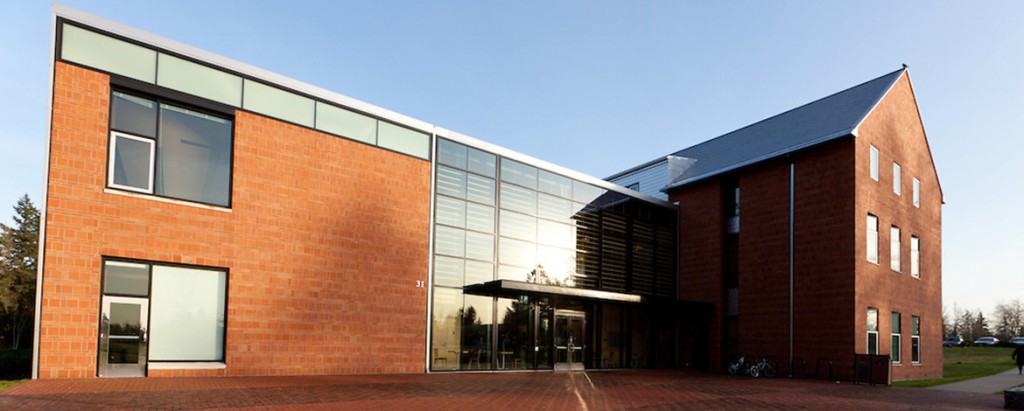Page 693 • (14,077 results in 0.058 seconds)
-
community, the only indigenous group in Norway, and a group that has long been discriminated against in Norwegian culture. Efforts were undertaken in the mid-1800s to exterminate their language and way of life. Children were taught in schools that Sámi — depicted back then as small, scrawny and sickly — were inferior. This socially constructed idea of race was taught at Norwegian universities until the 1940s, Storfjell said. It’s why Storfjell, who passes as white in the United States, nevertheless
-

November 12, 2012 A group of nine Computer Science and Computer Engineering students competed at an international computer programming competition Nov. 3. Team sets sights on next year By Jesse Major ’14 A group of nine Computer Science and Computer Engineering students competed at an international computer programming competition Nov. 3. First time competitor, Ben Landes ’14, described the Association for Computing Machinery International Collegiate Programming Contest as “sports for nerds
-
World ConversationsThe “World Conversations” series is one of the Wang Center’s activities that support and strengthen the university’s globally focused academic programs and offer public education programming. World Conversations is designed to give students returning from study away – semester programs as well as short-term courses conducted each January – an opportunity to share with the campus community what they learned and experienced. Through a series of concurrent sessions, it is an
-

, Jones was the first in his family to pursue higher education, something he has drawn from throughout his time at PLU. “I got accepted fast as heck,” he said. “I just remember being ecstatic about that.” Jones comes from a small family — “they’re kind of quirky people,” he said. His great-grandparents emigrated from Europe at the tail end of the Great Depression. “I came here flying solo in a lot of ways,” he said of PLU. Still, Jones acknowledges that he wasn’t totally alone. He counts on his chosen
-
of them at PLU. Additionally, Jones was the first in his family to pursue higher education, something he has drawn from throughout his time at PLU. “I got accepted fast as heck,” he said. “I just remember being ecstatic about that.” Jones comes from a small family — “they’re kind of quirky people,” he said. His great-grandparents emigrated from Europe at the tail end of the Great Depression. “I came here flying solo in a lot of ways,” he said of PLU. Still, Jones acknowledges that he wasn’t
-
The Wild Hope Center for Vocation is excited to offer opportunities for alumni and friends of PLU to consider our common vocation to promote human and ecological flourishing, especially in a time of increasing polarization and environmental degradation. These presentations focus on the core of PLU’s mission to link learning with care for others, their communities, and the Earth. As a university committed to life-long learning, we are eager to welcome thoughtful discussion among our alumni and
-

October 1, 2013 Editor’s Note: A Warm Winter Welcome Welcome to the winter edition of Scene—and, in the spirit of the season, a stockingful of newness. Starting with me. My name is Sandy Deneau Dunham, and I’m Scene’s brand-new editor. As a journalist who’s been away from journalism for a spell, I am thrilled and honored to join Scene—and Pacific Lutheran University. I had bumped into PLU here and there over my 20-plus years in the Pacific Northwest—first as an editor at The News Tribune, and
-
April 18, 2008 Lutes find trip to New Orleans inspiring, shocking At first, the neighborhoods seemed like any other to the PLU students traveling around New Orleans over spring break. But then they began to notice that many of the houses were empty, as hollow-eyed windows stared blankly back at passerby, with no furniture, no families, and sometimes no interior walls. The strange cross hatched markings on the buildings – on closer inspection – revealed themselves to be a grim haiku that search
-

the University of Washington. At the same time she worked as a volunteer organizing her local community to restore habitat on Muck Creek, a tributary to the Nisqually River. For the next decade she then worked for the Nisqually Indian Tribe as their salmon recovery program manager, coordinating the development and implementation of a plan to recover Nisqually salmon. In August of 2011, Dorner took on a new challenge when she accepted a position at the Puget Sound Partnership, a new Washington
-

comprehensive tests. But Leah Sweeney ‘17, a Fast Track student working on her Master of Business Administration, faced additional challenges -- as a new mother who needed to get started on a career, continued education seemed out of reach. “I never really was set on going to graduate school, it was something that sort of happened by accident,” Sweeney said. “I saw a flyer (for the Fast Track program) and I was like, ‘I can’t go to grad school. The application process is very intimidating, you have to pay a
Do you have any feedback for us? If so, feel free to use our Feedback Form.


